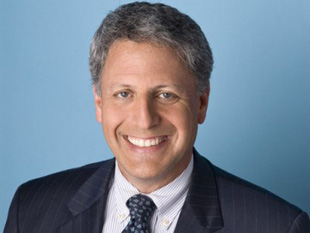NPR’s incoming president and CEO, Gary Knell, inherits challenges that are well-reported elsewhere: repairing the network’s image after scandals forced three executives to resign this spring; fighting to salvage federal funding and looking for new funding models; and maintaing good relations with 268 member stations.

At the Lab, we’re most curious about Knell’s vision for NPR’s digital future. He comes to NPR by way of Sesame Street, a multi-platform franchise by all accounts. During 10 years as CEO of Sesame Workshop, the nonprofit behind the beloved show, the program has expanded into most of the countries on earth and to virtually every digital platform.
“Some reporter asked me, ‘Are you in agreement about the digital direction of NPR? And the answer was 110 percent,” Knell told me. “If we’re not doing the Wayne Gretzky thing, of skating to where the puck is going on the distribution side, where our audience wants to find our content, we’re going to be out of business.”
Knell’s predecessor, Vivian Schiller, accomplished much in her two years at NPR: During her tenure, the network launched its new, newsy website, released a hugely popular iPad app and tablet site, significantly expanded its social-media footprint, and, under digital media GM Kinsey Wilson, expanded its team of developers, designers, and product managers to about 50 people, and the total digital staff, including journalists and members of its Digital Services division, to 200. The organization even dropped the “radio” from its name.
Knell referred to himself as “nudger in chief” when it came to expanding Sesame Street’s digital presence. The Sesame Street website receives millions of unique visitors per month, he said, and more people watch Big Bird online than on television. There are more than 20 Sesame Street iOS apps in the App Store. Sesame Street is even on Wii and Xbox. He founded the Joan Ganz Cooney Center (named for Sesame Street’s creator) and raised $15 million to fund digital-media projects that promote literacy.
“I think the relevancy for these local stations has gotten heightened, not lessened, as we enter the 21st century.”
Knell said his goal is bringing public radio to all the places listeners are. “We live now in a world that’s highly complex, and people have choices.” So, while “public radio needs to be serving its local markets in local radio,” he said, “it also needs to have people be able to access that content on mobile devices and iPads and everything else.”
Knell is one of those people: He’s a radio listener, himself. “Even before I got this job,” he told me, “I’d sit in my kitchen in New York and listen to KPLU in Tacoma, because I love their jazz format. And that’s all on the NPR iPad app — and it made me become a member of KPLU.”
For the record, Knell is also a dues-paying member of WNYC and of WFUV, where he serves on the advisory board.
He continued: “I remember being on a road trip 30 years ago and driving across America — and just having the ability to listen to NPR wherever you were, it was an amazing treasure.” And that hasn’t changed, he said, “especially as we’ve seen the news business morph and serious investigative journalism on a local basis come under economic uncertainty.”
In fact, “I think the relevancy for these local stations has gotten heightened, not lessened, as we enter the 21st century.”

And that’s why NPR’s digital expansion is not without tension. Many local stations, particularly smaller ones, fret about something called “digital bypass,” the idea that consumers will ditch their local stations because they can get NPR programming from NPR.org, mobile apps, satellite radio, and podcasts. Before the web, FM stations were the sole outlets for programs like Morning Edition and All Things Considered.
It remains to be seen how will Knell address that concern. “I need to know a lot more,” he said. “I was sort of appointed to the job about seven minutes ago. But, look, I know it’s a big issue. Obviously it’s an economic issue for the stations if the national provider just blows out everything and buries the localism — that’s not a good thing. So we have to figure out what the right balance is, and I’ve got a lot of learning to do. And I plan to visit a bunch of stations and listen to them in the first hundred days.”
It’s not easy being green.
Knell was not yet familiar with the Public Media Platform, the planned “super API” that will centralize content from NPR, PBS, American Public Media, Public Radio International, and PRX. (We didn’t have time to talk about Argo, the pilot project that launched a dozen blogs last September at member stations around the country.)
He does blog, as Megan pointed out. And he created a Twitter account almost as soon as the CEO news emerged on Sunday.
“Yeah, aren’t I hip?” he said.
The fact that more than a thousand people (1,328 as of Monday night) are now following Knell on Twitter “shows you not so much how powerful Gary Knell is,” he said, “but it shows you the power of NPR — and how interested people are in learning about what this new guy has to say.”
“It’s a way of connecting with the public in a very direct way that you can get input and feedback, which is the fabulous part about social media. And it’s also, I think, a message to our staff and the stations that we want to be players in this, as well.”